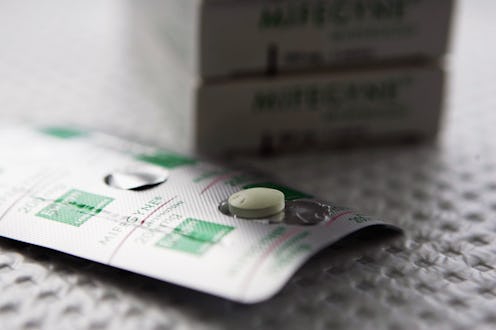News
North Dakota Bans The Abortion Pill
Once the dust settles on admitting privileges, ambulatory surgical centers and waiting period laws, the next frontier for anti-abortion legislators may be the abortion pill. The North Dakota Supreme Court upheld a ban on medication abortion — a non-surgical procedure using the abortion pill — on Tuesday, effectively halting the use of the medication in the state. According to The Associated Press, North Dakota's lone clinic stopped providing medication abortions on Wednesday, and the clinic doesn't plan on taking further legal action.
Enacted in 2011, the law bans the "off-label" use of misoprostol, a common abortion-inducing drug, and prohibits the use of mifepristone under non-FDA guidelines. However, most abortion clinics in America, including North Dakota's Red River Clinic, follow evidence-based guidelines, which is backed by medical research.
Although mifepristone, which is sometimes known as RU-486, was approved by the FDA in 2000, the drug agency has yet to recognize misoprostol. Currently, misoprostol is recognized as just a stomach ulcer-preventing drug, even though it's commonly used during medication abortions. In fact, reproductive rights advocates have said in the past that misoprostol is preferred because it allows women to have a medication abortion up to the ninth week of pregnancy; without misoprostol, medication abortions may only be done through the seventh week.
The Red River Clinic, which has served as the state's sole abortion clinic since 1998, uses the mifepristone-misoprostol combination in all there medication abortions. With this law upheld by the North Dakota Supreme Court, Clinic director Tammi Kromenaker told The AP that no medication abortions can take place at the clinic from now on. "I've directed staff to not offer (medication abortions) effective today," she told the news source, adding that she didn't want to put any of her employees "in jeopardy."
The AP reports that roughly 20 percent of the clinic's 1,300 abortions each year are drug-induced. Kromenaker said eight women had scheduled medication abortions for this week, but had to make new arrangements as of Wednesday.
The North Dakota Supreme Court ruling is yet another blow for reproductive rights activists trying to block state legislators from further impeding abortion access in swaths of the South and Midwest. Just last week, an Oklahoma district court judge upheld a law similar to North Dakota's, effectively banning the use of telemedicine abortion in the state and limiting the overall use of the abortion pill.
Abortion-inducing drugs have been beneficial for many women who live in rural or remote areas, and was once viewed as a way to increase abortion access in the wake of clinic closures. However, states have slowly but surely restricted the use of these drugs, whether through blocking telemedicine abortion or, like North Dakota, banning medication abortions altogether.
Images: Getty Images (2)
